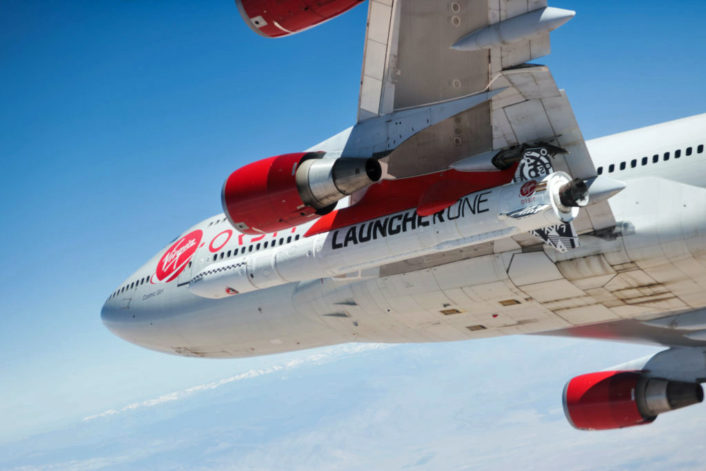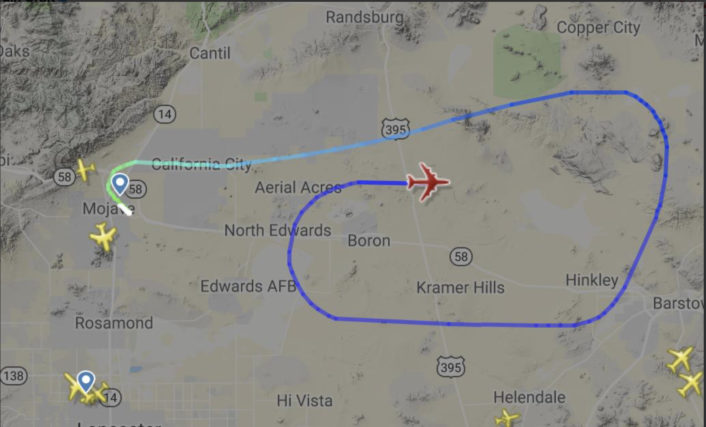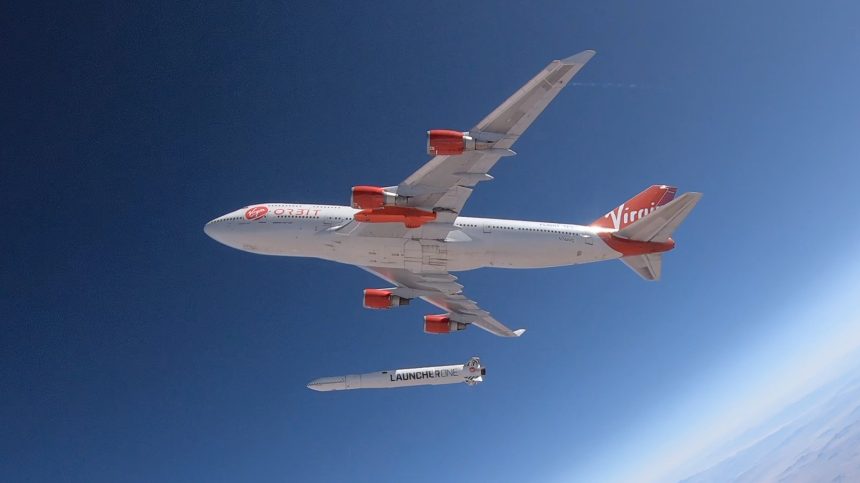Test Drop of LauncherOne Unpowered Test Rocket Verifies Separation Technology.
Sir Richard Branson’s company, Virgin Orbit, conducted a successful test drop of an unpowered LauncherOne rocket on Wednesday, July 10, over California’s Mojave Desert near the Mojave Air & Space Port. The test is the latest step in Virgin Orbit’s goal to offer an affordable, small payload orbital launch capability to both commercial and government contract customers.
The unpowered air-launch drop test was the last major step toward the next phase of testing for LauncherOne, a future powered flight following a drop from the Boeing 747-400 named “cosmic Girl”. Wednesday’s test drop was initiated from an altitude of 35,000 feet using an unpowered LauncherOne vehicle filled with antifreeze and water as ballast to simulate a payload. Following yesterday’s test drop the LauncherOne test vehicle fell seven miles to earth and its destruction following impact with the desert.

The Boeing 747-400 drop-test mothership aircraft was flown by noted test pilot and Air Force Academy graduate Kelly Latimer, a combat pilot and also a graduate of the USAF Test Pilot School. Latimer is a veteran of the Virgin Galactic program and has also flown the WhiteKnightTwo specialty built aerial launch vehicle.
In a blog post on VirginOrbit.com published Tuesday, the company said, “We’ll be monitoring and rehearsing a million things, but this test is really all about those few seconds just after release, as we ensure the rocket and aircraft separate cleanly and observe how the rocket free-falls through the air.”

The Virgin Orbit LauncherOne project is one of many recent commercial space launch projects, not all of which have succeeded. Following the dramatic first flight of late billionaire Paul Allen’s Stratolaunch aircraft on April 19, 2019, the Reuters News agency ran a story on May 31 saying the Stratolaunch flight program would be shut down until a buyer for the ambitious project came forward. A June 14, 2019 report on CNBC.com by reporter Michael Sheetz said, “Holding company Vulcan is seeking to sell Stratolaunch at $400 million, people familiar with the matter tell CNBC.”
Branson’s Virgin Orbit LauncherOne may be a more practical approach to short lead-time, low cost orbital launches. LauncherOne is claimed to have a payload capacity of 300 kilograms (660 lbs.), although Space.com reports the payloads can be up to “1,100 lbs. (500 kilograms)”. Extremely short launch lead times can be only 24 hours from mission preparation to orbit, a feature that may make this launch technology attractive to military customers.
Branson’s greatest achievement with LauncherOne may be even more practical; cost. Boosting a payload into orbit using Virgin Orbit and LauncherOne may cost as little as $12M USD per mission. This compares to $62M USD to launch a larger 50,000 lb. payload into orbit using Elon Musk’s SpaceX Falcon 9 rocket. On a pound-per-dollar basis, SpaceX’s Falcon 9 is less expensive, but LauncherOne can specialize in smaller, shorter lead-time orbital payloads.
Virgin Orbit has not said when the next phase of testing, to include launching a powered LauncherOne into orbit from the 747-400 launch plane, will take place, but reports suggest it will happen soon. Virgin Orbit has confirmed the operational rocket for the first powered air launch has “already undergone extensive testing”.









